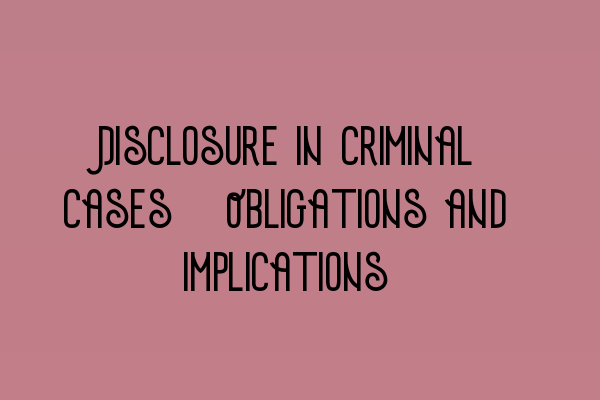Disclosure in Criminal Cases: Obligations and Implications
As a solicitor at SQE Criminal Law & Practice Law UK, it is crucial to understand the significance of disclosure in criminal cases. Disclosure refers to the process of providing all relevant evidence to the defense in a criminal case. It plays a fundamental role in ensuring a fair trial, protecting the rights of the accused, and upholding the principles of justice.
The obligation to disclose arises from the duty of the prosecution to act fairly and the right of the accused to a fair trial. The Criminal Procedure and Investigations Act 1996 (CPIA) sets out the guidelines for disclosure in England and Wales. It places an obligation on the prosecution to disclose all material that is relevant to the defense case, whether it is in favor of the accused or undermines the prosecution’s case.
Proper disclosure is essential to prevent wrongful convictions and miscarriages of justice. By providing the defense with all relevant evidence, it enables them to prepare a robust defense strategy, challenge the prosecution’s case, and present their own evidence effectively.
The implications of inadequate disclosure can be far-reaching. It can result in a breach of the accused’s right to a fair trial, undermine public confidence in the criminal justice system, and potentially lead to wrongful convictions. It is essential for prosecutors to fulfill their obligations in a timely and thorough manner.
In recent years, there have been concerns about the quality and timeliness of disclosure in criminal cases. The Post Office scandal, where hundreds of people were wrongfully convicted due to withheld evidence, highlighted the importance of addressing disclosure failures and improving the system.
To ensure effective disclosure, prosecutors must conduct a thorough and diligent review of all relevant evidence. This includes not only evidence that supports the prosecution’s case but also evidence that may undermine it. It is essential to adopt a proactive approach and consider all potential lines of inquiry to ensure nothing is missed.
Moreover, the recent advancement in digital technology has presented new challenges in the disclosure process. With the increasing amount of digital evidence, such as emails, social media posts, and CCTV footage, prosecutors must adapt their practices to effectively manage and disclose this evidence.
At SQE Criminal Law & Practice Law UK, we recognize the importance of staying updated with the latest developments in disclosure practices. Our solicitors undergo continuous training and professional development to ensure they are equipped with the necessary skills and knowledge to handle disclosure effectively.
To support our legal professionals, we offer comprehensive SQE 1 and SQE 2 preparation courses. These courses provide aspiring solicitors with the necessary knowledge and skills to succeed in the SQE exams and excel in their legal careers. If you’re preparing for the SQE exams, check out our SQE 1 Practice Exam Questions and SQE 1 Practice Mocks FLK1 FLK2 to enhance your preparation.
In addition to our preparation courses, we also provide information on SRA SQE Exam Dates. Staying informed about the exam dates and requirements is crucial for aspiring solicitors, as it allows them to plan their preparation effectively.
Disclosure is a fundamental aspect of criminal practice, and it is essential for solicitors to maintain the highest standards of professionalism and meet their disclosure obligations. By doing so, we contribute to the integrity of the criminal justice system and uphold the rights of all individuals involved.
At SQE Criminal Law & Practice Law UK, we are committed to providing exceptional legal services and ensuring that proper disclosure is upheld in every criminal case we handle. Trust us to handle your legal matters with utmost professionalism and dedication.
For more information on our SQE 1 and SQE 2 preparation courses and to stay updated with the latest developments in the legal field, visit our website.
*Disclaimer: This blog post is for informational purposes only and does not constitute legal advice. Consult with a qualified solicitor for professional advice tailored to your specific situation.
